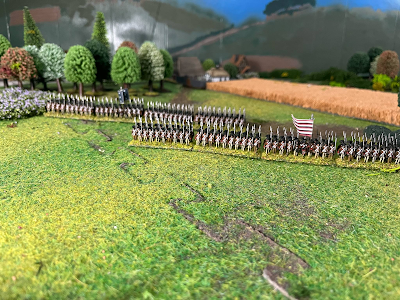Dear Reader,
Like so many other hobbyists, Warlord was kind enough to send a few sprues of their new Epic Battles: Revolution range to me for review. I picked them up on April 14th, and have completed painting both a British and Continental Battalion for the rules I use, or two regiments each for Warlord's Black Powder.
The British are painted as the 64th Regiment of Foot (where my ancestor, James Webster, served): red coats faced black. and the Continentals are painted in a common color scheme for New England and Pennsylvania Continentals: brown coats faced red. I have intentionally painted both units in linen (tan/beige) overalls or gaitered trousers, a long pant which was common summer issue in the middle and later years of the war.
There is a more full review below after the photos. So, without further introduction: the two battalions.
First of all: they are not figures that will make material culture perfectionists best pleased. The bayonets are on the wrong side of the muskets as a result of structural issues, there are minor errors with the officers' uniforms, some people were complaining today that the Hessians all have mustaches, for example. For me, more than any of that, the most frustrating part is that the British infantry are not in open order, but in a release like this, they were never likely to be. There are always gripes to be had with 10/15mm figures. If you are a material culture purist, go purchase Perry's excellent set of British infantry.
Moving from the bad to the good: these figures, by and large, are an excellent depiction of the uniforms of British and Continental troops, and depending on how you paint them, can represent troops at almost all stages of the war. You can indeed, as I suspected, paint the troops in full gaiters, half-gaiters, or gaitered trousers depending on your preference. This is much less noticeable than attempting the same on Perry's 28mm figures, giving a great deal of flexibility of representing troops from all stages of the war with one sprue.
Moving from the good to the excellent: the figures are exceptionally well designed for painting quickly. I've painted 400 figures since I received the review sprues on April 14th, despite the fact that it is a relatively busy time of year (finals) in my work as a professor. I won't say that they are easy to paint, or that they paint themselves, or something like this, but I do believe that Warlord has hit their stride in capturing an impressive amount of detail on the figures, but doing so in a way that is natural to paint. The way that the breeches, belt, and waistcoat are oriented on the front of the figure is natural and easy to paint. The facings, and even the lace on the facings, is easy to pick out (and this is coming from someone who would rate my painting skills as subpar).
If you are looking for a great way to introduce your local club to the AWI, or even to eighteenth-century warfare more broadly by using the Hessian sprue for the Seven Years War, these figures provide a cheap, effective, and rewarding entry point. I will definitely be purchasing a selection for my university wargame club, as we prepare to game the 250th anniversaries of the American War of Independence. I hope you will as well.
Thanks for Reading,
Alex














.jpg)








.jpg)






.png)
.png)
.png)
.png)
.png)
.png)
.png)


.png)





